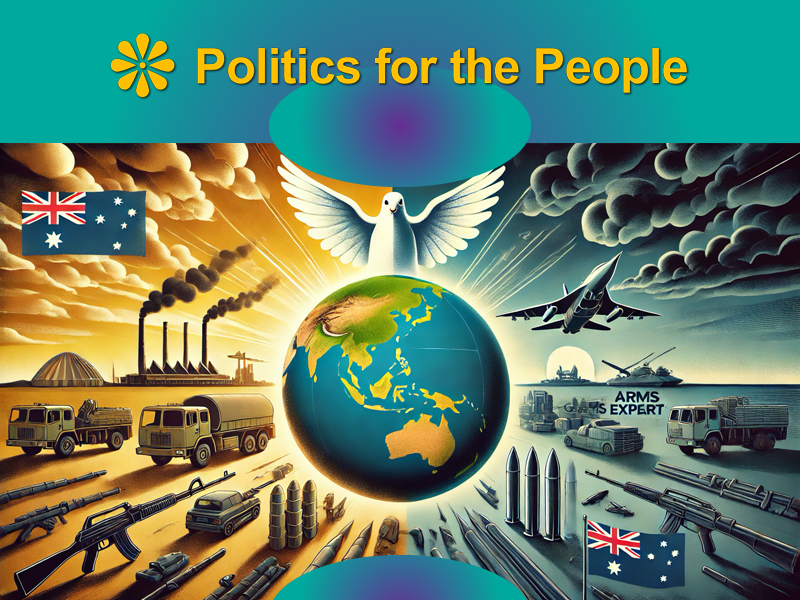Description
Unpack the critical decision facing Australia: should it become an arms exporter or global peace promoter? Dive into our detailed analysis.
Introduction: Global Peace vs Arms Export
Global peace vs arms export: Australia is at a critical juncture that could redefine its global identity. The nation faces a significant choice: pursue a path as a leading arms exporter or embrace the role of a global peace promoter. This decision transcends mere economics and touches upon Australia’s moral values and its long-term sustainability on the international stage. This analysis delves into the scientific evidence and multifaceted impacts of both paths, advocating for a future where peace takes precedence.
Economic Stability vs. Moral Responsibility
Economic Benefits of Arms Exportation
Arms exportation offers tangible economic benefits, including increased foreign reserves and job opportunities in the defence sector. Firms involved in arms production experience stable management and often see growth in employment rates. These economic gains can be large, making arms exportation a tempting choice for bolstering Australia’s economy.
Ethical Dilemmas of Arms Trade
However, the economic advantages come with substantial ethical concerns. Arms exports play a significant role in global conflicts, often worsening violence, and instability. The policy landscape around arms exports is fraught with ethical and legal challenges, requiring strict compliance with both national and international laws. This complex interplay between economic benefits and ethical obligations raises a crucial question: do the financial gains justify the moral cost?
Impact on World Peace
The Contrasting Impacts of Tourism and Arms Exportation on Peace
While tourism and arms exportation both significantly impact global relations, their contributions to world peace differ drastically. Here’s a more in-depth examination:
Tourism’s Role in Promoting Peace
Tourism is often touted as a force for peace, fostering cultural exchange and mutual understanding among nations. Studies have shown that through tourism, people from diverse backgrounds come into contact, share experiences, and often build lasting friendships. These positive interactions can lead to a greater understanding between cultures, potentially reducing prejudices and misconceptions. Moreover, tourism encourages countries to maintain peaceful relations conducive to safe travel environments, thus directly linking economic benefits to peaceful coexistence.
Economic Impact of Tourism
The economic implications of tourism are also significant, as it directly contributes to the GDP of countries, supports millions of jobs worldwide, and promotes infrastructural development. For example, tourism generates revenue that helps preserve historical sites and natural reserves, which are not only treasures for the host country but also attract international visitors, creating a cycle of positive economic and cultural impacts.
Arms Exportation and Its Challenges
In stark contrast, arms exportation often contributes to international tension and conflict. By supplying arms, nations can inadvertently or deliberately fuel conflicts in volatile regions, leading to long-term instability and suffering. The dynamics of the arms trade often complicate diplomatic relations and can entangle countries in moral and ethical dilemmas about whom they are supporting and why.
Economic and Security Dimensions of Arms Trade
While arms exportation may provide short-term economic gains through job creation in the defense sector and profits for arms manufacturers, these benefits are often overshadowed by the long-term consequences of increased global instability. Additionally, the security aspect of arms trade involves a delicate balance. Nations exporting arms must navigate complex international laws and treaties, such as the Arms Trade Treaty, which aims to regulate the trade to ensure that arms do not exacerbate conflicts or contribute to human rights abuses.
Broader Implications for Global Peace
The arms trade’s negative impact on global peace is profound. It not only exacerbates existing conflicts but can also be a catalyst for new ones, undermining efforts toward global stability and peace. In contrast, promoting peace and reducing arms exportation can help in building a more stable international order where diplomacy and dialogue prevail over conflict and aggression.
By understanding the contrasting impacts of tourism and arms exportation on peace, it becomes clear that the path towards fostering global harmony lies in enhancing cultural exchanges and minimizing conflict-driven trades. This strategic focus not only aligns with moral obligations but also promotes long-term global stability and prosperity.
Domestic Benefits and Global Influence
Reaping the Benefits of Peace Promotion

Opting to reduce arms exports can lead to substantial benefits for both the domestic economy and Australia’s international stature. Studies suggest significant savings for taxpayers by cutting defence expenditures (Martin, 1999). Moreover, by positioning itself as a peace-promoting nation, Australia can enhance its reputation as a global leader in diplomacy and peacekeeping efforts, fostering a more stable and prosperous international community.
Conclusion
The choice between becoming a leading arms exporter and a global peace promoter is more than an economic decision—it reflects Australia’s values and vision for the future. By prioritizing peace, Australia aligns itself with long-term sustainability and moral responsibility, setting a standard for others to follow.
Question for Readers
Considering the economic and ethical dimensions, do you believe Australia should prioritize global peace over arms exportation? How can Australia effectively balance these interests?
Call to Action
Let’s shape a future where Australia leads as a beacon of peace. Engage with us in this vital discussion—your insights are crucial in directing our nation’s path forward. Share your thoughts and be a part of the movement towards a peaceful and sustainable world. Please share this article with your contacts and on social media to help spread the word about the importance of prioritizing peace over arms.

